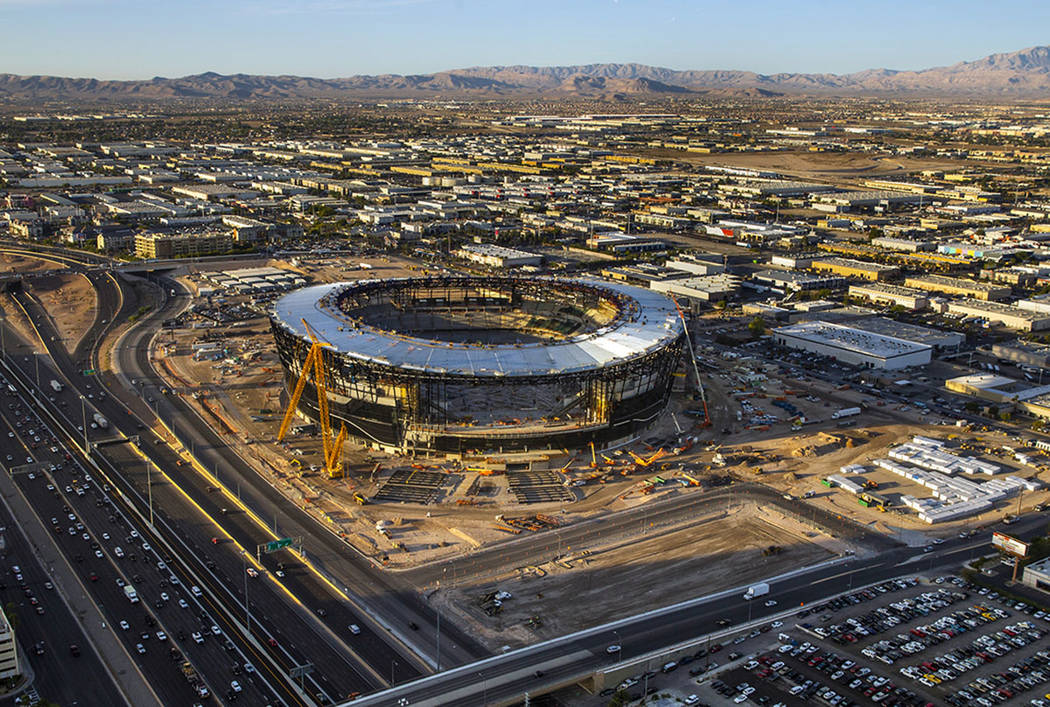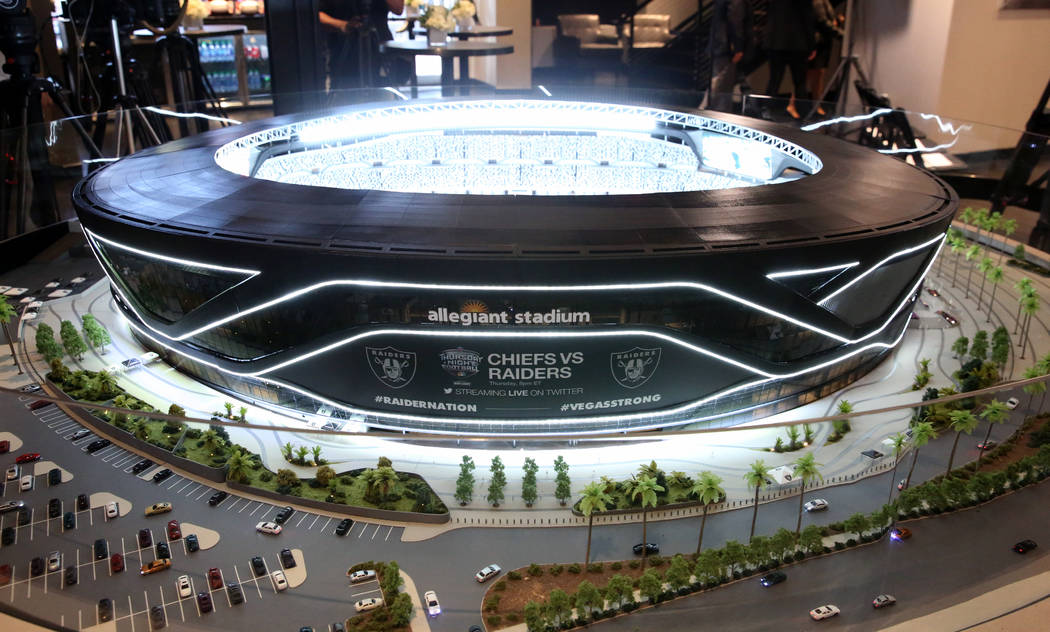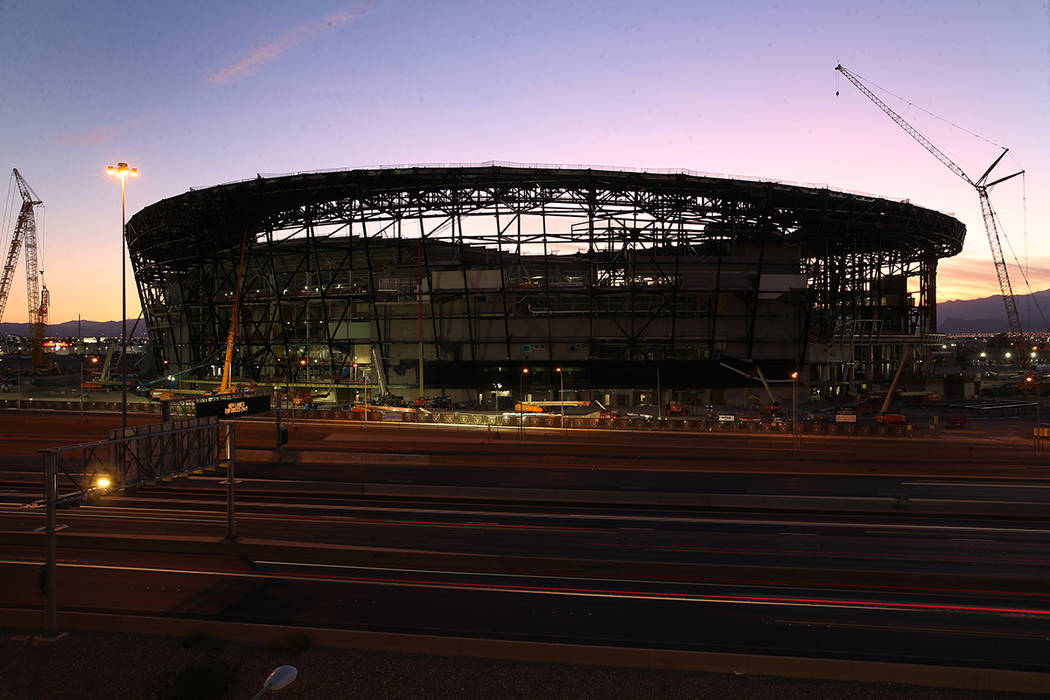Raiders, UNLV stadium dispute could be decided by Stadium Authority
The snag in the scheduling of three UNLV non-conference football games at Allegiant Stadium is boiling down to priorities and the interpretation of five words.
And it could take a review by the Las Vegas Stadium Authority to resolve it.
While UNLV is locked in as a tenant of the $2 billion, 65,000-seat indoor venue scheduled to be completed July 31, the team and its activities are still secondary to the primary tenant, the Raiders, which are contributing roughly $1.25 billion toward its construction while the public is putting in $750 million via a tax on hotel rooms supporting bonds.
Two non-conference games permitted
The UNLV Joint Use Agreement signed off by the Raiders and Nevada Board of Regents on March 27, 2018, clearly states that UNLV is entitled to play two non-conference games in the stadium with one game — the season-opener with the University of California — identified by date, Aug. 29, in the agreement.
But any other game would have to be cleared by the Raiders through a schedule of priorities listed within the agreement. Ultimately, the Stadium Authority must vote to sign off on UNLV’s scheduled use of the stadium and if there are any disputes, the authority would resolve them.
The tentative UNLV schedule next season includes home non-conference dates with Louisiana Tech on Sept. 5 and Arizona State on Sept. 12 in addition to the Cal game.
The Arizona State and Cal games, both power conference Pac-12 opponents, were agreed upon by the schools well before regents signed the Joint Use Agreement with the Raiders. The ASU game was first announced July 24, 2015, and the Cal game, Nov. 1, 2017. It’s unclear when the game with Louisiana Tech, a Conference USA team from Ruston, Louisiana, was scheduled.
‘Deliberative and collaborative process’
“The joint-use agreement clearly provides a deliberate and collaborative process to make sure that scheduling at the new stadium is clear to everyone and fair to everyone,” Jeremy Aguero, a principal with Las Vegas-based Applied Analysis, which serves as staff for the Stadium Authority, said Tuesday.
UNLV’s bid to have three non-conference games in the stadium the first year it is open is based on language in the agreement.
The agreement says, “(UNLV) shall have the right to schedule two non-conference … games to be played at the stadium each UNLV season following the first UNLV season during which the UNLV team plays UNLV team home games at the stadium.” At issue is the interpretation of the phrase “following the first UNLV season” and whether it refers to 2020 or 2021.
“The section text does not specifically bar scheduling such games in 2020, but the language suggests such games could not be scheduled until 2021 as it refers to the season following the first UNLV season at the stadium,” Aguero said in an email.
The agreement requires UNLV and the Raiders to reconcile scheduling differences but if they can’t, the Stadium Authority would be asked to step in and resolve it.
Agreement highlights
An entire section within the 63-page agreement is dedicated to scheduling. Some of the highlights:
*All Raiders home games, NFL events and major events that were scheduled to be hosted at the stadium before UNLV finalizes its schedule of home games are referred to as “Priority Events” and take precedence.
*UNLV has the right to schedule two non-conference home games — referred to in the contract as “Priority UNLV Team Home Games” — each season. UNLV is allowed to schedule on any Saturday that a Priority Event has not been scheduled.
*Once the Raiders have been notified of a planned Priority UNLV Team Home Game, it’s considered confirmed unless the Raiders respond within 30 days.
*Following the first season in the new stadium, UNLV can request a Priority UNLV Team Home Game over the Labor Day weekend every other year.
*A section of the agreement directs the Raiders and UNLV to “meet at reasonable intervals … to manage and finalize” the game schedule. The Raiders are required to provide UNLV with a tentative schedule of available dates and times to host games.
Sources with knowledge of the process say the first year of scheduling may be the most difficult because of higher demand for events to try out the newest big venue available. The Raiders haven’t confirmed any prospective concert dates, but August, September and October weekends are expected to be at a premium in those months and the Raiders’ contracted scheduling company will be eager to provide events that will draw large crowds to the stadium.
*There is some flexibility within the agreement that enables modifications of game starting times to accommodate late changes if a broadcast company wants to televise a UNLV game, a move that generally provides more revenue to the school. The Raiders are required “to assess the feasibility of the change and allow the change to be made if it is commercially reasonable.” But such a change can’t interfere with Raiders home games.
*The agreement requires a 12-hour window between UNLV and Raiders events to allow for preparation of the field surface. The flexible floor surface of Allegiant Stadium will enable UNLV to play on an artificial turf surface, the Raiders to play on a natural grass surface wheeled into the stadium and concert events on the concrete floor of the venue.
While it seems that all scheduling contingencies are spelled out in the agreement, the Stadium Authority would become the arbitrator if there were any unresolved disputes. The nine-member board meets regularly and considers contracts and policies involving stadium construction.
UNLV’s agreement with the Raiders rejects taking disputes to court because of the expense.
Contact Richard N. Velotta at rvelotta@reviewjournal.com or 702-477-3893. Follow @RickVelotta on Twitter. Review-Journal staff writer Mark Anderson contributed to this report.




















